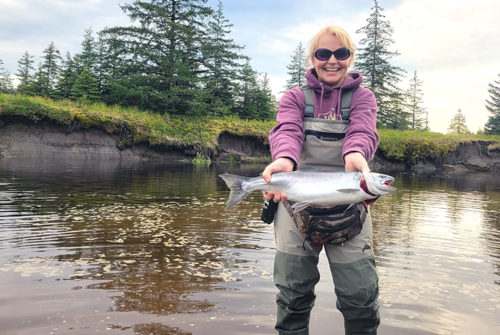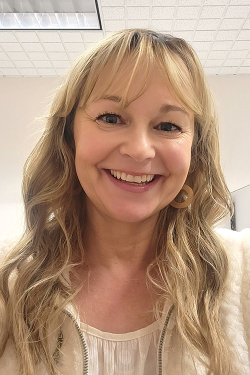NOAA Fisheries Alaska Introduces New Tribal Relations Coordinator

The following is courtesy of NOAA Fisheries Alaska Region:
NOAA Fisheries’ Alaska Region has selected Amilee Wilson as their new Tribal Relations Coordinator. Amilee previously served as the Tribal Coordinator for the NOAA Fisheries West Coast Regional Office in Lacey, Washington, and Portland, Oregon. She worked extensively on grants administration including emergency fisheries funding associated with the Coronavirus Aid, Relief, and Economic Security (CARES) Act and Consolidated Appropriations Act. Amilee was a recipient of the 2022 NOAA Administrator’s Award for her exemplary work on CARES Act implementation.
As the Tribal Coordinator for the West Coast Region, Amilee revamped the Tribal Relations Training Program. She also served as a founding member and Co-Chair of the NOAA Native American/Alaska Native Employee Resource Group. She was often consulted as an expert to assist with tribal relations issues across the agency. Amilee has more than 25 years of experience working with Native American Tribes in the private, state, and federal sectors. She has gained extensive knowledge and experience with tribal histories, treaties, sovereignties, self-governance, protocols, customs, and traditions.
What is your key responsibility?
NOAA Fisheries is committed to advancing equity and environmental justice, including equal treatment, opportunities, and environmental benefits for all people and communities. We are also building on continuing efforts and partnerships with underserved and underrepresented communities. I use NOAA Fisheries’ Equity and Environmental Justice Strategy and its goals and objectives to guide my work as the Alaska Region’s Tribal Relations Coordinator.
My key responsibility is to improve NOAA Fisheries’ relations with Alaska Native tribal and coastal communities. This includes providing technical support on tribal consultation, sovereignty, governance, and protocols during the development of projects and programs. One objective is to establish and maintain strong cross-cultural relationships with tribal leaders, councils, and technical staff to help them ensure equitable access to cultural and natural resources important to their lifeways. In addition, I develop, recommend, and distribute tribal policies, issue tribal program procedures and guidelines, and prepare a wide variety of reports in response to internal agency work. For example, I have recently established and chair the Alaska Regional Tribal Engagement Team. This increases internal agency collaboration and communication on outreach to Alaska Native tribal and coastal communities. The team also helps staff to stay on top of what each of the divisions in our agency’s Alaska Region are doing in tribal relations and provides opportunities to partner on tribal outreach.
Where did you grow up?

I grew up on a 200-acre cattle ranch in northwestern Olympia, Washington. It was hard work getting up early to feed the animals and maintain the fields and family garden, especially during the summer and fall when we were putting in hay for the cattle and garden canning for the winter. When I did get spare time, I explored our pastures, forests, and three different creeks that ran through our property. I was truly amazed watching the salmon push their way up to the spawning grounds in our small creeks. What a sign of persistence and dedication! I think this is where my love for the environment, conservation, and stewardship came about and why I became a fisheries biologist.
I am a descendant of the Shinnecock Nation located on the eastern side of Long Island (New York) but did not have the privilege of being raised on my native grounds. Our family has a long history of military service and that is why I was born on the West Coast. Our cattle ranch was located adjacent to the Skokomish Indian Tribe, and they became our Native family. I made forts in the woods, fished in the rivers, and played in the fields with my native family. They taught us how to plant the three sisters (squash, beans, and corn) in our garden and traded their smoked salmon for our chickens in the late summer and fall.
What is your educational background?
I received my Master’s degree in Public Policy and Bachelor’s degree in Environmental Studies from Evergreen State College. I earned Certificates in Tribal Relations from the Hatfield Institute for Tribal Government at Portland State University and in Diversity, Equity, and Inclusion in the Workplace from the University of Southern Florida.
Are you a member of a notable community organization or mentorship program?
I have taken part in the NOAA Employee Mentorship Program and have benefited both as a mentee and mentor. I highly recommend the program!
I currently live in Yakutat in Southeast Alaska, and am a member of Lakeside Church, which sponsors different events for the local community there. Prior to moving to Yakutat, I worked at a local Salvation Army in Washington for approximately 30 years serving meals to the homeless. I am also a member of the Affiliated Tribes of the Northwest Indians and National Congress of American Indians.
You won’t find me indoors much. The outdoors is my playground. I enjoy fishing, hunting, hiking, camping, snowshoeing, gardening, and chasing the Northern Lights.
What does being a career civil servant mean to you?
I like being a career civil servant because I answer to the federal government and not a political party. I focus primarily on the growth and well-being of people and the communities to which they belong. I share power, put the needs of others first, and help people develop and perform as highly as possible in their daily lives. Working and building trust with tribal and underserved communities to open access to cultural and natural resources and form strong relationships can be very challenging but it is also extremely rewarding work and worth the effort. Tribes are among our strongest allies and share our conservation and stewardship mandates.
What advice would you have for someone interested in a career at NOAA Fisheries?
Keep your head down, work hard, put your heart and soul into what you do. Don’t be afraid to start at the bottom and work your way up. People will notice and provide a helping hand along the way. Make sure to take advantage of the NOAA Fisheries Outreach and Education opportunities available to you. Find staff within the agency that have the career you are interested in. Call them up and ask if they would be willing to talk with you about their career. You’d be surprised at how many staff are excited to speak on what they do for the agency and assist you in your journey by sharing their experiences and resources.



